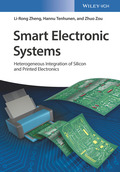Smart Electronic Systems
Heterogeneous Integration of Silicon and Printed Electronics

1. Auflage November 2018
296 Seiten, Hardcover
150 Abbildungen (50 Farbabbildungen)
Monographie
Kurzbeschreibung
Unique in focusing on both organic and inorganic materials from a system point of view, this text offers a complete overview of printed electronics integrated with classical silicon electronics. With a focus on new applications, including wearable electronics and flexible PCBs.
Jetzt kaufen
Preis: 129,00 €
Preis inkl. MwSt, zzgl. Versand
Euro-Preise für Wiley-VCH- und Ernst & Sohn-Titel sind nur für Deutschland gültig. In EU-Ländern gilt die lokale Mehrwertsteuer. Portokosten werden berechnet.
Unique in focusing on both organic and inorganic materials from a system point of view, this text offers a complete overview of printed electronics integrated with classical silicon electronics.
Following an introduction to the topic, the book discusses the materials and processes required for printed electronics, covering conducting, semiconducting and insulating materials, as well as various substrates, such as paper and plastics. Subsequent chapters describe the various building blocks for printed electronics, while the final part describes the resulting novel applications and technologies, including wearable electronics, RFID tags and flexible circuit boards.
Suitable for a broad target group, both industrial and academic, ranging from mechanical engineers to ink developers, and from chemists to engineers.
Definition of Printed Electronic Systems
Technology, Applications and Markets
Challenges and Future Trends
References
PART 1: MATERIALS AND PROCESSES FOR PRINTED ELECTRONICS.
FUNCTIONAL ELECTRONIC INKS
Introduction
Conductive Inks
Semiconducting Inks
Summary
FLEXIBLE SUBSTRATES AND FOR PRINTED INTERCONNECTIONS
Introduction
Polyimide versus Paper Sheets
Paper Surface Properties and Printed Interconnections
Reliability Assessment of Paper Based Printed Interconnections
Summary
PART 2: PRINTED ELECTRONIC BUILDING BLOCKS.
PRINTED THIN FILM TRANSISTORS (TFTS) AND CIRCUITS
Introduction
Printing Process of TFTs
Electrical Performance of the TFTs
Carbon Nanotube TFTs and Circuits
Summary and Outlook
PRINTED PASSIVE WIRELESS SENSORS
Introduction
Sensing Materials
Time Domain Based Sensors
Frequency Domain Based Sensors
Conclusion and Future Work
PRINTED RFID ANTENNAS
Background
Trends and Challenges
Narrow Band RFID Antennas
Wideband RFID Antennas
Sensor-enabled Antennas
Conclusions and Future Work
PRINTED CHIPLESS RFID TAGS
Introduction
Applications and Market Projection
Time Domain Chip-less RFID Tags
Frequency Domain Based Chip-less RFID tags
Summary and Future Work
PART 3. SYSTEM INTEGRATION FOR PRINTED ELECTRONICS.
FLEXIBLE BIO-PATCH
Background
Integration Methodology
Paper-based Bio-patch
Polyimide-based Bio-patch
Summary and Future Work
HUMIDITY SENSOR CARDS
Introduction
System Overview
Integration Methodology
Demonstrations of Humidity Sensor Cards on Plastic and Paper
Bendability of the Cards
Conclusion
SUMMARY AND OUTLOOK
In 2001, he received his Ph.D. degree in electronic system design from the Swedish Royal Institute of Technology (KTH) in Stockholm, Sweden.
He has authored more than 400 scientific publications. He is member of the steering board of the International Conference on Internet-of-Things.
Hannu Tenhunen is professor at the Swedish Royal Institute of Technology (KTH) in Stockholm, Sweden, and holds invited and honorary professorships in Finland, USA, France, China and Hong Kong. During the last 20 years he has been actively involved in high technology policies, technology impact studies, innovations and changing the educational system. For instance, he was director of various European graduate schools and he was Education Director of the new European flagship initiative European Institute of Technology and Innovations (EIT) and the Knowledge and Innovation Community: EIT ICT Labs.
He has authored more than 700 scientific publications and holds 9 patents. Furthermore, he was one of the originators of the interconnect-centric design, globally asynchronous/locally synchronous concept and network-on-chip (NoC) paradigms.


